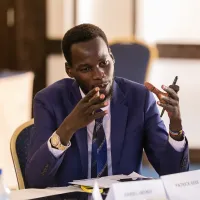Reflections from Marrakech: 2025 Ibrahim Governance Weekend
27 June, 2025
From 1-3 June, the Mo Ibrahim Foundation convened its annual flagship Ibrahim Governance Weekend (IGW) in Marrakech, a UNESCO World Heritage city, under the high patronage of His Majesty Mohammed VI, King of Morocco. The IGW returned to Marrakech after eight years, having since been hosted in distinguished African cities such as Nairobi, Abidjan and Kigali.
This year’s event gathered together African and global leaders across various sectors, as well as fellow members of the Now Generation Network of youth changemakers, renewing commitment to good governance, prosperity and African agency amidst a fast-changing global context currently marred with tense volatility and a risk of collapsed multilateralism.
As a young leader committed to my own country - South Sudan’s transformation and Africa’s future, I not only found the theme Financing The Africa We Want timely and resonant with myself and contemporaries, but also the conversations were intellectually stimulating and grounded in African perspectives such as African Solutions to African Problems.
Could this finally be the turning point from untapped potential to impactful reality?
Morocco offers clear inspiration, proactively shaping its own narrative through groundbreaking infrastructural projects like its expansive transport network and solar farm. This isn't merely about energy independence - it embodies a fresh, practical approach toward sustainable growth.
A meeting of minds and generations in times of crisis
It was inspiring to see generations of African changemakers, from former heads of state to youth leaders, business minds to academics, come together with wholehearted dedication and purpose, pushing for Africa to lead in shaping its own future amid global upheaval.
Particularly noteworthy was the active involvement of young leaders, notably from the Foundation’s Now Generation Network, whose voices are instrumental in reorienting Africa’s role in an uncertain global landscape.
While some have argued from an African standpoint that global institutions and systems are rigged against Africans, do not meet their needs and often exclude the continent from decision-making processes, international governance has equally been lauded for providing stability in global security, trade and diplomacy. Perhaps peace, structural equity, and governance require new narratives entirely distinct from, yet complementary to, established liberal ideals. Complex shifts aren’t accomplished overnight - why not embrace hybrid, tailored solutions, at least for the time being?
Whatever the case, Africa must respond to the changing world, and quickly. This reality should reframe the traditional narrative and facilitate a transition to African responsibility and ownership.
In my view, the inter-generational leadership, wealth of knowledge, experiences, ideas and energy at the IGW carry hopes of a continent rising.
Rethinking Financing The Africa We Want
Drastic cuts in funding to global aid programs in health, education and development assistance has set off alarms about the sustenance of those initiatives, including in South Sudan, where a third of the country’s 12 million people are dependent on humanitarian aid.
While acknowledging the imminent implications of this funding crisis, participants in all sessions at the forum agree that we must dismantle the longstanding ideology of Africa - heavily dependent on foreign aid amidst an abundance of wealth. How can the continents’ riches be put to the benefit of their people? Indeed big disruption to aid should not raise an alarm for Africa, but the urgency for transformative actions.
These bold actions should include weaning Africans off aid dependency by confronting the reality that aid is not an act of generosity, but often the bare minimum owed in light of imperial exploitation. As such, Africa’s rightful position as a creditor of historical injustice could well be asserted against bonded debts it holds to international financial markets, systems largely controlled by non-African actors. Africa’s role must go beyond occupying a seat at the decision-making table. It should have a dedicated place in the workshop, fully equipped to help construct the very frameworks that govern capital raising and investment. Active participation in reshaping these markets requires strengthened governance, the elimination of corruption, curbing illicit financial flows and strategic engagement of the diaspora.
Youth, peace and the future
While advancing these discussions on financing Africa, I am reminded of Dr Mo Ibrahim, the convener pointing us to not forget about peace and security as the foundation for development. I further reiterate for efforts to end conflicts in the continent from Sudan, the Sahel to the Horn of Africa and further balance social equity. Peace is not limited to 'Silenced guns'.
I co-sign that Africa does not lack solutions nor is it poor to fund its development. Africa needs leadership to truly achieve self determination, sovereignty and prosperity. This requires the continent to prioritise, prepare and empower its young people to drive public policy, business, and emerging technologies such as AI in order to leapfrog into a new era. At the same time, headway also depends on revising how Africa is framed by non-Africans - from a continent seen through the lens of deficiency and dependency to one recognised for its agency, innovation, and rightful place as a global actor.
The 2025 IGW transcended mere convention. It facilitated transformative dialogues, collective insight, and generational synthesis. The resounding call for action compels young Africans, alongside established stakeholders, to shift from theoretical aspiration toward concrete implementation.
I return to my work in South Sudan’s peace process invigorated with optimism and accountability emanating from Marrakech.



